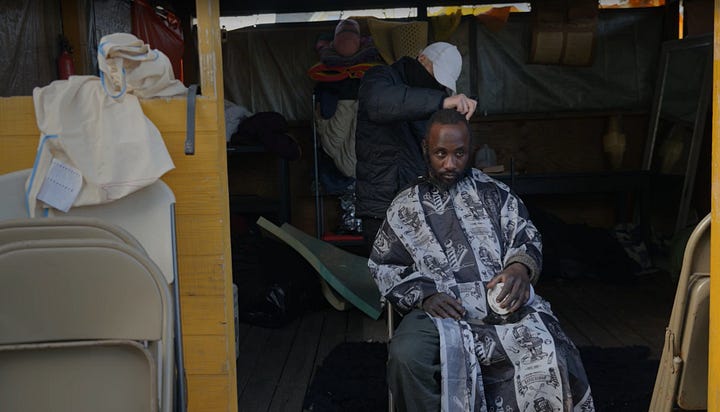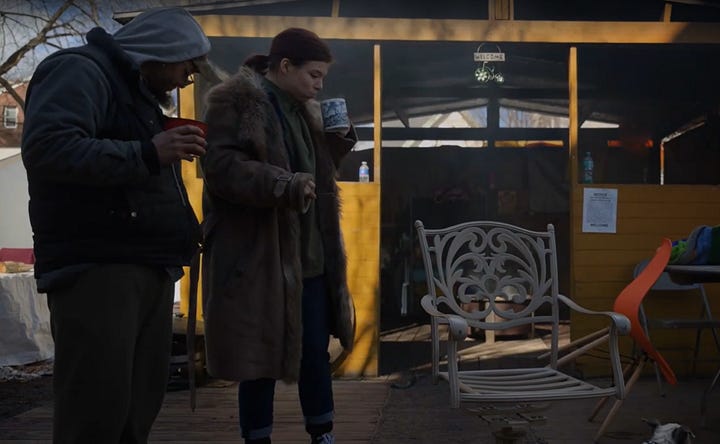Catholic Workers Soften Their Hearts
Catholic Workers respond to crises with encounter, radical welcome, and practicing the hospitality of childcare and soup kitchens; a new documentary explores life of Casa de Amistad's tiny village.
The Sacred Hospitality of Childcare
In mid-February I spent a week caring for two of my nephews, ages two and three, while their parents and siblings absconded to warmer climes. Acquaintances were variously amused, skeptical, or sympathetic; a few made “Mr. Mom” type jokes.
“Don’t worry,” I reassured them. “I did this for ten years.” Which is true: I stayed home with our littles while my wife taught at the local university.
I figured it wouldn’t take me long to get back into the swing of wrangling toddlers; I even bought a new baby sling.
Your best bet for surviving a day with toddlers is this: like a master chess player, think three or four moves ahead. You want to wake up before they do, for instance, because if they get going before you do, you’re toast.
Also, as Jesus constantly warns during Advent: be vigilant. Take your eye off a toddler for even a minute and there’s a 29% chance he will find some creative new way to kill himself, e.g., flinging himself head-first from the couch onto the beanbag just inches from the raised brick fireplace hearth (to offer one completely random example).
Well, good news! Everyone survived the week without serious mishap, including me. I fell into bed exhausted at the end of each day, as expected. The high temps that week were in the single digits below zero, so we did a lot of indoor field trips. We visited the zoo, the science museum, the pricey indoor playground. We changed many, many diapers in public restrooms at each of these kid-friendly, germ-infested destinations. We got the stomach flu, we did a lot of laundry, etc., etc.
You may be wondering: Where is this going? What does this have to do with the Catholic Worker?
It’s just this: Catholic Workers and stay-at-home moms (it’s still mostly moms, right?) share in common the daily practice of the works of mercy carried out in one-on-one, personal relationships. Being a stay-at-home mom would be good practice for living in a house of hospitality, and vice versa. The main difference between a Catholic Worker and your average American stay-at-home mom is that the Catholic Worker tends to get more respect and generally has community to help with the work.
If Catholic Workers encounter Christ, so do the people who care for little children: “(Jesus) took a little child…in his arms (and) said to them, ‘Whoever welcomes one of these little children in my name welcomes me’” (Mark 9:36-37).
You know who else welcomes little children? Jacqueline Allen-Douçot and the folks at the Hartford Catholic Worker. Jacqueline had an excellent essay in their most recent newsletter (reprinted in Thursday’s CW Reads) about how we might best respond to the present moment. Without setting aside the importance of prophetic public witness, she suggests that we must prioritize the care of our hearts. Toward this end, she draws on the wisdom of Pope Francis…and the joy of the children in their neighborhood. Her reflection leads this issue.
—Jerry
FEATURED

“How to Have a Sacred Heart”
“What are we to do?” Jacqueline Allen-Duçot asked in a recent Hartford Catholic Worker Newsletter, referring to the many crises of the present moment. In Thursday’s CW Reads, she answers the question with powerful conviction:
For me, I need to deal with my own heart first. I must heal my inner darkness to avoid casting shade on others. Only then can I act collectively to heal our world. We must feel our feelings. They are—and they are not right or wrong. What we do with them is a different story. I want to make the world a better place. I have good reasons for my bitter feelings, but they will not help with that work.
Two Stories from the New York Catholic Worker
Two high school seniors from Regis High School on Manhattan’s Upper East Side, shared an essay in The Catholic Worker (re-published in Friday’s CW Reads) about what they have learned from encountering others during the past two years of practicing weekly hospitality at the St. Joseph’s House morning soup kitchen.
They write:
Last week, we took a seat on the radiator for a brief moment to take it all in. This vantage point gave us a perspective from the front of the house all the way into the kitchen. We saw conversations taking place, smiles, laughs, a lot of eating. But the most important observation was that everyone was welcomed and given the opportunity to get a good meal. The Catholic Worker is nourishing for both body and soul.
COMMUNITY NEWS & NEWSLETTERS
New Issue of “Radix”
The second issue of the Romero House Catholic Worker’s newspaper Radix hit mailboxes this week. The new community—based in Witchita, Kansas—shared upcoming roundtable discussions and community garden dates, words from Dorothy Day and Oscar Romero, and several articles on localism, fasting, and the question “Do I love my neighbor through my work?” You can subscribe to Radix and read digital editions on their website.
Casa Maria CW Protests for Mahmoud
Members of the Casa Maria Catholic Worker (Milwaukee, Wisconsin) joined a protest for the release of Mahmoud Khalil, the Columbia University student protest leader detained by ICE on March 15. See photos on their Instagram.
Changes Coming to Open Door Community
Hospitality, the newspaper of the Baltimore-based Open Door Community, noted a new season of beginnings and endings. Ed Loring, one of the community’s co-founders, stepped back from leadership in November. The community was founded in 1981 in Atlanta, Georgia, and began its transition to Baltimore in 2017. Hospitality itself will transition to a digital-only format beginning with its next issue, except for incarcerated readers, who will continue receiving print editions.
To read the full February/March 2025 issue and stay updated on the Open Door’s work, visit their website: Open Door Community Newsletter.
How & Why We Garden
Since moving onto the land nine years ago, the St. Isidore Catholic Worker community (Cuba City, Wisconsin) has developed “a set of unofficial, flexible principles…for the way we engage with the soil,” writes Eric Anglada in his Embracing Repair newsletter:
A couple of years ago, while pulling weeds in one of our patches of restored Prairie, I realized that this, too, was gardening. If gardens can be any place where human hands mix with the life of the land, then I am beginning to see the entirety of this 25 acres as a garden. It is, after all, a place we tend, a place with which we interact and engage to bring forth life.
Read the entire essay, including the five principles the community follows, at Embracing Repair.
Mustard Seed Community Farm Seeks Summer Interns
Mustard Seed Community Farm and Catholic Worker in Central Iowa is still accepting applications for its summer Agro-Ecology Education program. Internships run 8-12 weeks between May and October, requiring about 30 hours per week. No experience is necessary—just curiosity and a commitment to food justice. Interns receive room and board, plus access to farm-grown produce. For more information, visit their website or contact Alice McGary at 978-471-8414.
Let the Children Come



Catholic Worker Life?… It’s for the kids. On the left, the Hartford Catholic Worker offers afterschool hospitality for children in the neighborhood. And, right, Betsy Keenan of Strangers and Guests (Maloy, Iowa) demonstrates a loom to junior Catholic Worker Farmers
CW IN THE MEDIA
New Documentary Spotlights Amistad CW's Backyard Village




A new documentary about the Amistad Catholic Worker’s backyard tiny home village for unhoused people premiered Tuesday on Connecticut Public Television. Where Then Shall We Go? follows the development of the house’s backyard community over two years, capturing residents’ efforts to govern themselves while confronting the challenges of addiction, mental illness, and the law. The full documentary is available for streaming on the CT Public website and on YouTube.
In a Facebook post, Mark Colville thanked filmmaker Ryan Caron King “for so gracefully telling the story of Amistad House, Rosette Village, and the ongoing struggle to decriminalize homelessness in our city.”
Read Colville’s entire post on Facebook.
WORDS FROM THE ELDERS
“Taking Inventory”
by Dorothy Day from January 1951, excerpted from Dorothy Day: Spiritual Writings, edited by Robert Ellsberg
This last year, at St. Joseph’s House of Hospiality, we gave out, roughly speaking and underestimating it at that, 460,000 meals. Also 18,250 nights’ lodging. Thisis what the world sees and if we wished to impress the world we would multiply this by eighteen years, and the figures would be truly impressive.
But suppose a mother should say, in a plea for sympathy, ‘I’ve put one thousand and ninety-five meals on the table this last year. I’ve washed fifty thousand plates.’
It is easy to see how foolish it is to look at things in this light, in this big way. I am sure God is not counting the meals. He is looking at Tony Aratari, Joe Monroe, Ray Taylor, turning off their alarm clocks at five every morning to go downstairs to start the coffee, cut the bread. They get no credit for being noble. They have no realization of dying to themselves, of giving up their lives. They are more often than not abused by friends and relatives for not getting jobs, using their education, ‘supporting themselves,’ instead of living on charity. ‘This then is perfect joy,’ as St. Francis would say.
About us. Roundtable is a publication of catholicworker.org that covers the Catholic Worker Movement.
Roundtable is independent of the New York Catholic Worker or The Catholic Worker newspaper. This week’s Roundtable was produced by Renée Roden and Jerry Windley-Daoust. Send inquiries to roundtable@catholicworker.org.
Subscription management. Add CW Reads, our long-read edition, by managing your subscription here. Need to unsubscribe? Use the link at the bottom of this email. Need to cancel your paid subscription? Find out how here. Gift subscriptions can be purchased here.
Paid subscriptions. Paid subscriptions are entirely optional; free subscribers receive all the benefits that paid subscribers receive. Paid subscriptions fund our work and cover operating expenses. If you would like to stop seeing Substack’s prompt to upgrade to a paid subscription, please email roundtable@catholicworker.org.





So good to learn about Catholic Worker actions and programs in different communities. Peace & Blessings!